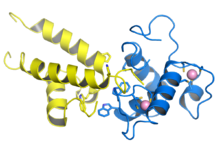
The small tumor antigen (also called the small T-antigen and abbreviated STag or ST) is a protein encoded in the genomes of polyomaviruses, which are small double-stranded DNA viruses. STag is expressed early in the infectious cycle and is usually not essential for viral proliferation, though in most polyomaviruses it does improve replication efficiency. The STag protein is expressed from a gene that overlaps the large tumor antigen (LTag) such that the two proteins share an N-terminal DnaJ-like domain but have distinct C-terminal regions. STag is known to interact with host cell proteins, most notably protein phosphatase 2A (PP2A), and may activate the expression of cellular proteins associated with the cell cycle transition to S phase. In some polyomaviruses - such as the well-studied SV40, which natively infects monkeys - STag is unable to induce neoplastic transformation in the host cell on its own, but its presence may increase the transforming efficiency of LTag.[2] In other polyomaviruses, such as Merkel cell polyomavirus, which causes Merkel cell carcinoma in humans, STag appears to be important for replication and to be an oncoprotein in its own right.[3]
- ^ Cite error: The named reference
cho_stag_2007was invoked but never defined (see the help page). - ^ Khalili, K; Sariyer, IK; Safak, M (May 2008). "Small tumor antigen of polyomaviruses: role in viral life cycle and cell transformation". Journal of Cellular Physiology. 215 (2): 309–19. doi:10.1002/jcp.21326. PMC 2716072. PMID 18022798.
- ^ Tsang, Sabrina H.; Wang, Ranran; Nakamaru-Ogiso, Eiko; Knight, Simon A. B.; Buck, Christopher B.; You, Jianxin; Banks, L. (1 February 2016). "The Oncogenic Small Tumor Antigen of Merkel Cell Polyomavirus Is an Iron-Sulfur Cluster Protein That Enhances Viral DNA Replication". Journal of Virology. 90 (3): 1544–1556. doi:10.1128/JVI.02121-15. PMC 4719616. PMID 26608318.
